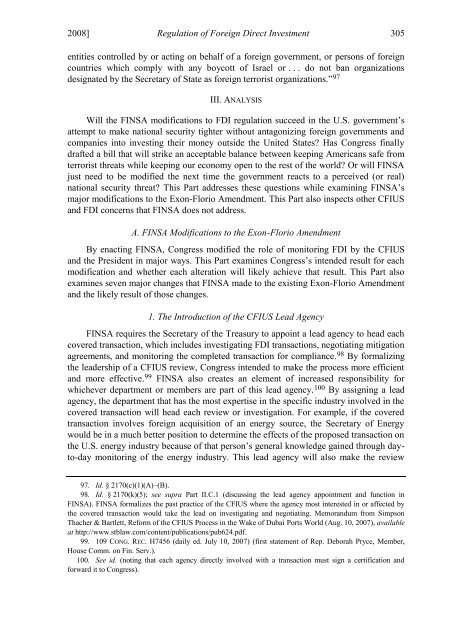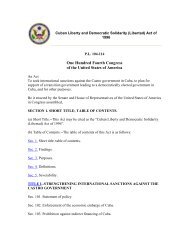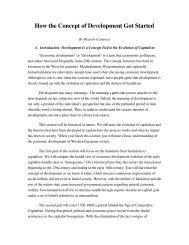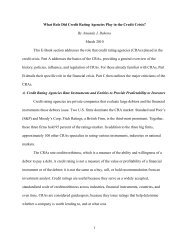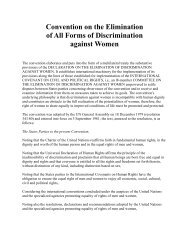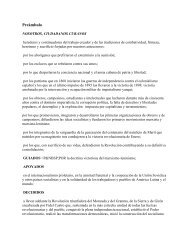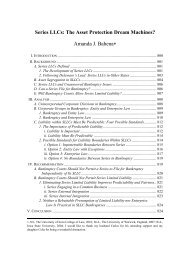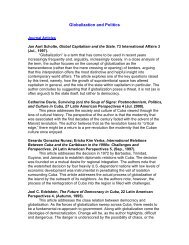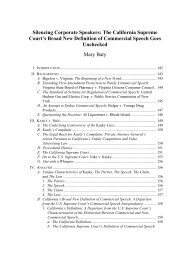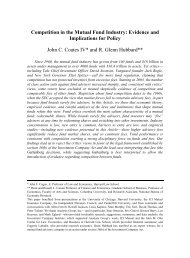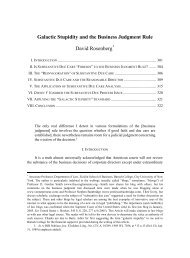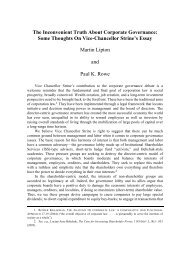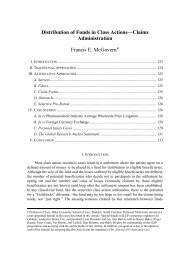Regulation of Foreign Direct Investment After the Dubai Ports ...
Regulation of Foreign Direct Investment After the Dubai Ports ...
Regulation of Foreign Direct Investment After the Dubai Ports ...
Create successful ePaper yourself
Turn your PDF publications into a flip-book with our unique Google optimized e-Paper software.
2008] <strong>Regulation</strong> <strong>of</strong> <strong>Foreign</strong> <strong>Direct</strong> <strong>Investment</strong> 305<br />
entities controlled by or acting on behalf <strong>of</strong> a foreign government, or persons <strong>of</strong> foreign<br />
countries which comply with any boycott <strong>of</strong> Israel or . . . do not ban organizations<br />
designated by <strong>the</strong> Secretary <strong>of</strong> State as foreign terrorist organizations.‖ 97<br />
III. ANALYSIS<br />
Will <strong>the</strong> FINSA modifications to FDI regulation succeed in <strong>the</strong> U.S. government‘s<br />
attempt to make national security tighter without antagonizing foreign governments and<br />
companies into investing <strong>the</strong>ir money outside <strong>the</strong> United States? Has Congress finally<br />
drafted a bill that will strike an acceptable balance between keeping Americans safe from<br />
terrorist threats while keeping our economy open to <strong>the</strong> rest <strong>of</strong> <strong>the</strong> world? Or will FINSA<br />
just need to be modified <strong>the</strong> next time <strong>the</strong> government reacts to a perceived (or real)<br />
national security threat? This Part addresses <strong>the</strong>se questions while examining FINSA‘s<br />
major modifications to <strong>the</strong> Exon-Florio Amendment. This Part also inspects o<strong>the</strong>r CFIUS<br />
and FDI concerns that FINSA does not address.<br />
A. FINSA Modifications to <strong>the</strong> Exon-Florio Amendment<br />
By enacting FINSA, Congress modified <strong>the</strong> role <strong>of</strong> monitoring FDI by <strong>the</strong> CFIUS<br />
and <strong>the</strong> President in major ways. This Part examines Congress‘s intended result for each<br />
modification and whe<strong>the</strong>r each alteration will likely achieve that result. This Part also<br />
examines seven major changes that FINSA made to <strong>the</strong> existing Exon-Florio Amendment<br />
and <strong>the</strong> likely result <strong>of</strong> those changes.<br />
1. The Introduction <strong>of</strong> <strong>the</strong> CFIUS Lead Agency<br />
FINSA requires <strong>the</strong> Secretary <strong>of</strong> <strong>the</strong> Treasury to appoint a lead agency to head each<br />
covered transaction, which includes investigating FDI transactions, negotiating mitigation<br />
agreements, and monitoring <strong>the</strong> completed transaction for compliance. 98 By formalizing<br />
<strong>the</strong> leadership <strong>of</strong> a CFIUS review, Congress intended to make <strong>the</strong> process more efficient<br />
and more effective. 99 FINSA also creates an element <strong>of</strong> increased responsibility for<br />
whichever department or members are part <strong>of</strong> this lead agency. 100 By assigning a lead<br />
agency, <strong>the</strong> department that has <strong>the</strong> most expertise in <strong>the</strong> specific industry involved in <strong>the</strong><br />
covered transaction will head each review or investigation. For example, if <strong>the</strong> covered<br />
transaction involves foreign acquisition <strong>of</strong> an energy source, <strong>the</strong> Secretary <strong>of</strong> Energy<br />
would be in a much better position to determine <strong>the</strong> effects <strong>of</strong> <strong>the</strong> proposed transaction on<br />
<strong>the</strong> U.S. energy industry because <strong>of</strong> that person‘s general knowledge gained through dayto-day<br />
monitoring <strong>of</strong> <strong>the</strong> energy industry. This lead agency will also make <strong>the</strong> review<br />
97. Id. § 2170(c)(1)(A)–(B).<br />
98. Id. § 2170(k)(5); see supra Part II.C.1 (discussing <strong>the</strong> lead agency appointment and function in<br />
FINSA). FINSA formalizes <strong>the</strong> past practice <strong>of</strong> <strong>the</strong> CFIUS where <strong>the</strong> agency most interested in or affected by<br />
<strong>the</strong> covered transaction would take <strong>the</strong> lead on investigating and negotiating. Memorandum from Simpson<br />
Thacher & Bartlett, Reform <strong>of</strong> <strong>the</strong> CFIUS Process in <strong>the</strong> Wake <strong>of</strong> <strong>Dubai</strong> <strong>Ports</strong> World (Aug. 10, 2007), available<br />
at http://www.stblaw.com/content/publications/pub624.pdf.<br />
99. 109 CONG. REC. H7456 (daily ed. July 10, 2007) (first statement <strong>of</strong> Rep. Deborah Pryce, Member,<br />
House Comm. on Fin. Serv.).<br />
100. See id. (noting that each agency directly involved with a transaction must sign a certification and<br />
forward it to Congress).


